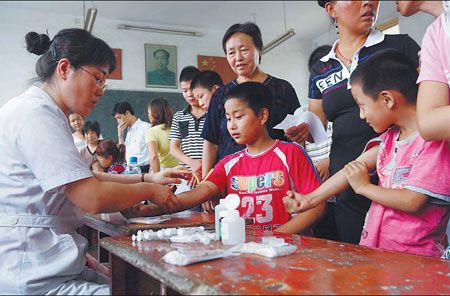More than 300 children with lead poisoning in Shaanxi province will receive free medical treatment, a local official says.
The children, who all live near Changqing industrial park in Fengxiang county, were found to have excessive lead content in their blood after examinations by medical staff at Xi'an Central Hospital.
"Both of my children took physical examinations that showed the lead in their blood far exceeded normal conditions," said Ma Shengqin, a farmer living near the industrial park, told China Daily yesterday.
"The lead in their blood is more than 250 mg per liter."
|

|
|
A doctor from Xi'an Central Hospital collects a blood sample from a boy on Friday in Fengxiang county. [China Daily] |
The normal lead content in blood ranges from zero to 100 mg per liter and health is affected if the content is over 200 mg per liter.
Ma said his children sleep more than before, cannot concentrate and react very slowly. All other children have similar symptoms, Ma said.
Fears were first raised over the health of local children when a parent took her child to the doctor in July.
The child was confirmed as suffering from lead poisoning and other parents, noticing similar symptoms in their children, also took their children to the doctor.
Local people believe that the nearby Shaanxi Dongling Lead and Zinc Smelting Factory was to blame for the poisoning. However, there has been no conclusive link.
"The factory is only about 400 to 500 m away from our houses," said a parent, surnamed Xue, 33.
A factory employee, surnamed Liang, told China Daily that managers had discussed the incident with local government officials in Fengxiang.
China Daily's attempts to contact the factory's deputy manager surnamed Sun were unsuccessful. Liang said he believed the factory would present a "reasonable" explanation and solution to the poisoning.
On Friday, the local government promised to give free treatment to the children, a local official said. Ma said that he had not been contacted about the offer.
An official surnamed Liu of Changqing township refused to comment.
In 2006, the factory was required to help relocate the nearby villagers because the lead from their production could harm people's health.
But so far only 100 of 581 households have been moved.
The villagers said they were willing to move but were short of money for new houses. The only thing they can do is to transfer their children to another school to avoid further poisoning.
About half of the parents in Maodaokou village have decided to transfer children to another school next semester. But others do not have enough money, so their children must stay.
Now the parents hope that the government can work with the factory to speed up the relocation process.
Many regions in Western China have introduced high-polluting industries without necessary environmental evaluation to boost the local economy, but the developments sometimes impact the health of local people.
Environmentalists urged the development model be changed to ensure people's health and safety.
(China Daily August 10, 2009)